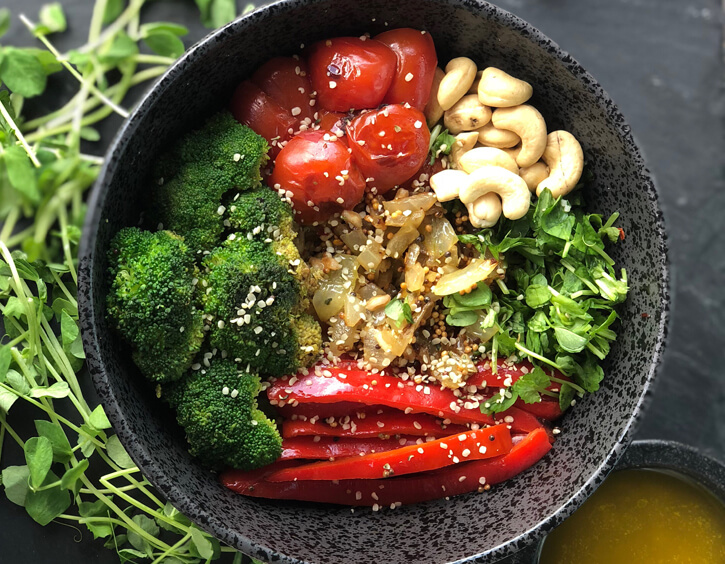Less than five percent of Americans get the recommended amount of fiber each day. Just checking if you heard that? Less than five percent of Americans get the recommended amount of fiber each day. That number blew me away when I first read it. In fact, I had to check my own fiber intake. Odds are that you may not be receiving enough fiber throughout the day. If you’re experiencing digestive issues, hormonal imbalances, sugar cravings, weight gain or an array of other health-related complications, it could be due to inadequate fiber intake.
The recommended amount of fiber is 25 grams a day for women and 38 grams a day for men (based on 14 grams per 1000 calories). These are the minimum recommendations. Most people get less than 15 grams a day. That’s a lot of constipated people! No wonder over 22 million people from the United States alone visit their physicians office each year with the primary complaint of digestive issues. For reference, our ancestors consumed 100 grams a day. While fiber is ultra important for preventing constipation and digestive issues, it does so much more, as you’ll see below.
Fiber plays a major role in digestion by keeping things moving through smoothly and taking unwanted pathogens (that create disease) with it in the process. It also helps to stabilize blood sugar, reduce cholesterol and lower blood pressure. Fiber is also the foundation for a healthy gut, which is where over 70 percent of our immune system lives and 90 percent of serotonin receptors are located (the neurotransmitter that makes you feel a sense of well-being). These are just a few of the magical benefits of fiber, not to mention all of the nutrients that accompany fiber. Many phytonutrients, or nutrients found only in plants that have massive healing effects on the body from skin health to brain health to gut health, are attached to fiber. When we eat foods with fiber we are also eating hundreds of nutrients that keep our bodies functioning at its best.
The case for fiber is strong and the list of benefits can be long, but I’ve narrowed it down to 10 good reasons to eat more fiber.
#1 Lack of fiber can lead to digestive issues and constipation.
Receiving the minimum amount of fiber each day (25 grams a day for women and 38 grams a day for men) plus plenty of water to keep the fiber moving can help to keep things flowing smoothly through the digestive system.
#2 Fiber is the foundation for a healthy gut.
By now you’ve heard that a healthy gut is important. There are trillions of bacteria in our gut that help to keep the gut functioning at its best. The gut can dictate the fate of the immune system, inflammation, and neurotransmitters, which is why you often hear a healthy gut leads to a healthy mind. What fuels these healthy bacteria? Fiber! Without fiber you cannot have a healthy gut. In fact, research shows that when we don’t have enough fiber (food) for the bacteria, they can start chowing down on our protective gut mucosal barrier—yikes!
#3 Fiber helps to balance hormones (including estrogen and hunger hormones).
If you’re experiencing symptoms of excess estrogen or often feel hungry right after you eat, chances are you may not be receiving enough fiber. Excess estrogen in the body is removed by fiber and fiber triggers hormones that signal you’re full.
#4 Fiber helps you fill up quickly and keeps you full longer.
This results in less empty calories consumed at that meal and in subsequent meals. This helps you naturally stop eating when you’re full and can help minimize overeating and excess caloric intake at that meal and in subsequent meals. If you’re trying to manage weight, fiber is key.
#5 Fiber helps to control blood sugar.
Fiber also helps to allow for a slow release of blood sugar into the blood stream. Picture fiber as holding onto the carbohydrates in that meal and slowly releasing just a little bit at a time over the period of 2-3 hours. This results in a steady stream of blood sugar that can be used by our cells for energy (i.e. sustained, steady energy!) as opposed to a meal that has no fiber. Processed carbohydrates (that have been stripped of fiber) can enter the blood stream rapidly. All of that sugar dumped into the bloodstream at once most likely can’t be entirely used for energy, therefore it’ll be stored as body fat. Plus, it creates an insulin surge (the hormone that takes sugar out of the bloodstream) followed by an insulin crash, which triggers a desire for more sugar or carbohydrate. Over time this can lead to weight gain, blood sugar and mood swings and unhealthy eating patterns.
#6 Fiber may reduce risk of lifestyle diseases like heart disease, cancer, diabetes and possibly Alzheimer’s disease.
Soluble fiber, found in oats, beans and apples, can lower cholesterol and blood sugar, resulting in reduced risk of heart disease and diabetes. Insoluble fiber found in whole grains, nuts and vegetables adds bulk to stool and may help food pass more quickly through the stomach and intestines, decreasing the risk of colon cancer. High-fiber diets may also reduce brain inflammation, which in turn could mean less cognitive decline and memory loss with age, and decreased risk of neurodegenerative diseases.
#7 Fiber may protect against breast cancer.
Observational studies demonstrate that high fiber intake is associated with a reduced risk of breast cancer. Researchers believe that fiber may reduce breast cancer risk by controlling blood sugar and decreasing estrogen levels.
#8 Eating high fiber foods may help to boost mood and cognition, and reduce anxiety.
According to this study, high fiber intake may reduce the risk for symptoms from depression. A possible mechanism is fiber’s ability to alter the gut microbiota to reduce inflammation and oxidative stress.
#9 Fiber helps produce short chain fatty acids in the colon through feeding healthy bacteria in our gut.
Short chain fatty acids can help to regulate metabolism, enhance mineral absorption, improve the gut mucosal barrier (and decrease pathogens that enter the bloodstream) and improve mood to name a few.
#10 Fiber is only found in plant-based foods.
Eating a wide variety of plant-based foods like beans, peas, lentils, fruits, vegetables, nuts and seeds has been shown to create a healthy gut. In order to get enough fiber, it’s important to consume enough plants. Dairy, meat, chicken, and fish have zero fiber (and zero healing phytonutrients). Not only are you not getting fiber and phytonutrients from animal products, but you’re also getting saturated fat and potentially trans fat, hormones, antibiotics, plastic and chemicals.
Nichole Dandrea-Russert, MS, RDN, has been a registered dietitian nutritionist for 25 years, specializing in heart disease, diabetes, sports nutrition and women’s health. For the past ten years, she has focused on plant-based lifestyles through inspiring and educating people about plant-based eating to optimize their health and the health of the planet. Nichole has been featured in Eating Well, Business Insider and Atlanta Journal Constitution. She is also a media spokesperson for The Weather Channel and local Atlanta television networks. A former triathlete and current yoga instructor, she shares her passion through her website Purely Planted. Nichole is the author of The Fiber Effect. She lives in Atlanta, GA with her husband.






